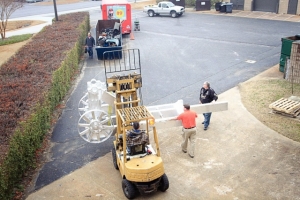Wayne Community College sends two more cannons to Fort Macon
By Phyllis Moore
Published in News on January 29, 2012 1:50 AM

News-Argus/MICHAEL BETTS
Chad Pate, right, welding instructor at Wayne Community College, pilots a replica of a Civil War cannon, while Ted Koger, computer integrated machining instructor, helps guide the cannon. The aluminum cannon is one of two created by students at the college. They will be placed at Fort Macon after being painted by the N.C. Division of Parks and Recreation.
Two more Civil War replica cannons have been crafted by Wayne Community College students and are being taken to Fort Macon State Park in time for its 150th Civil War Re-enactment in April.
Machining and welding students followed plans previously drawn by WCC mechanical engineering students based on 1840s-era renderings of an original cannon. The new pieces were made of aluminum to withstand coastal winds and salt spray that rotted previous wooden versions at the Atlantic Beach fort.
The first cannon created at the college was delivered to the state park in December 2010. The goal is to have the cannons installed for the re-enactment of the Battle of Fort Macon, planned for April 21-22.
N.C. Division of Parks and Recreation personnel will receive the carriage-and-chassis assemblies of the "32-pounder" cannons this week, and complete the painting part of the project at Cliffs of the Neuse State Park. Each cannon will be "married with a live-fire barrel and take a strategic position at the fort," officials said.
By having students tackle the project, savings to the state were estimated at more than $50,000 per cannon on the welding costs, as well as machining and programming, said Ted Koger, computer-integrated machining instructor.
The value for the students, though, cannot be measured, he said.
"This kind of project gives them a real-life project to work on," he said. "They get lectures and theory in class but this allowed them to see real manufacturing elements and demands that they normally wouldn't experience until they entered the work force. They get all kinds of skills, the gratitude of those they created them for, and the fulfillment of making something bigger than themselves.
"It is an excellent experience for them, to be able to make something that is something."
